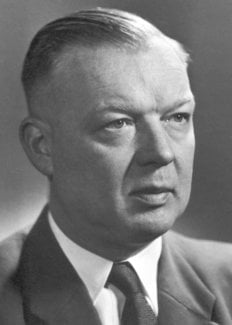Werner Forssmann
Biographical

Werner Theodor Otto Forssmann was born in Berlin on August 29, 1904, the son of Julius Forssmann and Emmy Hindenberg. He was educated at the Askanische Gymnasium (secondary grammar school) in Berlin. Leaving school in 1922, he went to the University of Berlin to study medicine, passing his State Examination in 1929. For his clinical training he went to the University Medical Clinic, working under Professor Georg Klemperer, and he studied anatomy under Professor Rudolph Fick. For clinical instruction in surgery he went, in 1929, to the August Victoria Home at Eberswalde near Berlin.
It was here that he was the first to develop a technique for the catheterization of the heart. This he did by inserting a cannula into his own antecubital vein, through which he passed a catheter for 65 cm and then walked to the X-ray department, where a photograph was taken of the catheter lying in his right auricle.
Subsequently he worked at the Charité, Berlin, and the City Hospital at Mainz, and then went to the Rudolf Virchow Hospital in Berlin for specialist training in urology under Dr. Karl Heusch. He was appointed Chief of the Surgical Clinic of the City Hospital at Dresden-Friedrichstadt and at the Robert Koch Hospital, Berlin. At the beginning of the Second World War, Forssmann served as a Sanitary Officer, reaching the rank of Surgeon-Major; but he became a prisoner of war until his release in 1945, when he went into practice with his wife, in the Schwarzwald.
From 1950 onwards he practised as a urological specialist at Bad Kreuznach, and since 1958 he has been Chief of the Surgical Division of the Evangelical Hospital at Düsseldorf, where he now lives.
In 1956 he was awarded, together with André Cournand and Dickinson W. Richards, the Nobel Prize for Physiology or Medicine and he was, in the same year, appointed Honorary Professor of Surgery and Urology at the Johannes Gutenberg University, Mainz.
In 1954 he was awarded the Leibniz Medal of the German Academy of Sciences; in the same year he was Guest of Honour at the National University of Cordoba, Argentina, where he was appointed Honorary Professor in 1961.
Since 1962 he is a Member of the Executive Board of the German Surgical Society. He is also a Member of the American College of Chest Physicians, and Honorary Member of the Swedish Society of Cardiology, the German Society of Urology, and the German Child Welfare Association.
In 1933 Forssmann married Dr. Elsbet Engel, who is also a specialist in urology. They have six children: Klaus (b. 1934), Knut (b. 1936), Jörg (b. 1938), Wolf (b. 1939), Bernd (b. 1940), and Renate (b. 1943).
This autobiography/biography was written at the time of the award and first published in the book series Les Prix Nobel. It was later edited and republished in Nobel Lectures. To cite this document, always state the source as shown above.
Werner Forssmann died on June 1, 1979.
Nobel Prizes and laureates
Six prizes were awarded for achievements that have conferred the greatest benefit to humankind. The 12 laureates' work and discoveries range from proteins' structures and machine learning to fighting for a world free of nuclear weapons.
See them all presented here.
